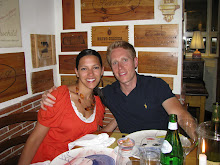
Things are pretty hectic as Nicole and I settle into our new house and prepare for a wedding that is week(s) away. We're also gearing up for our much anticipated honeymoon in Italy, and I'm a tad bit regretful that we won't be stepping foot into the region where I spent the most of my time in 2005, Le Marche. I feel like I owe it to the region to write a promotional piece in the event someone decides to go off the beaten path next time they travel in Italy.
Le Marche, or the Marches (whatever that really means) is in the same general latitude as Tuscany, and running from the east coast into the spiny center of the country, has as diverse a landscape. Unlike the western coast of the country, the Adriatic side boasts much flatter, longer beaches with gentler surf. And unlike in Abruzzo to the south, where it goes from beach to mountain almost immediately, much of Le Marche rises with a bit more moderation, first to rolling hills, then to ridges and valleys that eventually run into Umbria.
Much of my time was spent in Jesi, which is about 10 miles inland, with significant enough elevation in parts to see the ocean on a sunny day, of which there were plenty. The region does not contain any major cities, just some relatively small ports and historic towns like Urbino and Ascoli Piceno. But that's probably a major reason why it's such an undiscovered country for tourists, and why it can be so great for someone who wants to avoid the hordes.
My first impression, and that of many of my school friends, was that the locals were pretty unaccustomed to "tourists" in their neck of the woods and we mistook that as coldness and a lack of hospitaliano. We were used to the gregariousness of people in neighboring Umbria and Lazio. But we sold them short because, although they weren't used to straight up fanny-packing folks, they had seen Brits and Germans before, and there is also the initially curious population of East Africans, Pakistanis and Philippinos adding [darker] color to the area.
By the middle of my stay I realized how advantageous it was that these people had not become jaded by high volume tourism. They, like all italians I've encountered, are inherently proud of their commune, their small geographic area and all it has to offer, particularly in gastronomic terms. That bodes well for a newcomer who wants to see and learn. The region is pretty prosperous for Italy, balancing agriculture and industry, and you get the feeling that it's awakening, realizing that there is an intellectual as well as commercial market for its traditions and products.
To me it's an "if you make it, they will buy it" kind of thing in Italy; if you make foreigners aware of a wine or cheese or olive oil unique to your region, they will want it. Stamp a D.O.C. (denomination of controlled origin) label on it, and it's even more appealing (not trying to be too cynical here). The Marchegiani have definitely caught on to this, and with good reason, because they have a lot to offer in terms of wines, cheeses, pasta, etc., and they love to tell you all about them. For example, I've borne witness to a chef extolling the virtues of a particular kind of potato only grown on a certain side of a ridge near his house.
I often wondered if it was a good thing or bad thing that most people didn't know about the beautiful landscape; the apportioned fields, some sunflowers, some wheat, some grapes, some olives. The woodsy hills that I passed by on the train, imagining hunters in them chasing down wild boar. Bad that people back home looked puzzled when I told them where I was staying, or good that it was not overrun? You can take in a lot of the same sites you find in other parts, like ancient Ascoli Piceno or Renaissance Urbino, expansive caves in Frassassi, nice beaches in Senigallia.
It's easy to imagine yourself on a tuscan hillside, a field of sunflowers visible across a shallow valley, sipping some chianti with crostini. But you can almost as easily be sitting on a hillside in Le Marche overlooking a different field of sunflowers, the ocean in view, with a glass of verdicchio and some local pecorino.
I have no doubt that ten to twenty years on from now, Le Marche will no longer be the wilderness it is currently for Americans. With so much of the available property bought up at this point in Tuscany, Liguria, even Umbria and Lazio, Le Marche makes sense. It boasts its share of rustic to run down old farmhouses and villas just waiting for some ex-pat to take them over.
So why are we not going there when I've just extolled the virtues of the region? Well, we're not bringing fanny-packs, but we do owe the beaten paths their dues for this trip since it's Nicole's first time. I don't want to sound jaded though. I jump at any opportunity to go there; it's certainly a luxury for me, and to be there with Nicole is the experience of a lifetime. As for Le March, next time...




No comments:
Post a Comment